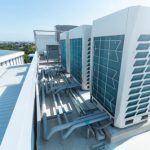Commercial HVAC 101: Understanding the Basics of Heating, Ventilation & Cooling
 Heating, Ventilation, and Cooling (HVAC) systems are essential for creating a comfortable and controlled indoor environment in commercial spaces. They play a critical role in maintaining optimal temperature, humidity levels, and air quality. In this blog, we will explore the basics of commercial HVAC systems, discussing their components, functions, and importance for businesses.
Heating, Ventilation, and Cooling (HVAC) systems are essential for creating a comfortable and controlled indoor environment in commercial spaces. They play a critical role in maintaining optimal temperature, humidity levels, and air quality. In this blog, we will explore the basics of commercial HVAC systems, discussing their components, functions, and importance for businesses.
1. Understanding HVAC Systems: Components and Functions
Commercial HVAC systems consist of various components that work together to ensure efficient heating, ventilation, and cooling. The primary components include:
– Furnace or Boiler: The furnace or boiler is responsible for heating the air or water that circulates within the system.
– Air Conditioning Unit: The air conditioning unit cools the air by removing heat and moisture.
– Ventilation System: The ventilation system ensures the exchange of fresh air and the removal of stale air, odors, and pollutants.
– Ductwork: Ductwork distributes the conditioned air throughout the building and returns the air back for further treatment.
– Thermostat: The thermostat is the control center that allows users to adjust and regulate the temperature, humidity, and other settings.
The primary functions of a commercial HVAC system are to provide heating during cold weather, cooling during hot weather, and ventilation to maintain fresh indoor air quality.
2. Heating: Creating Comfortable and Warm Indoor Spaces
Heating is a crucial aspect of any commercial HVAC system, especially during colder months. A properly functioning heating system ensures a comfortable indoor temperature, allowing employees, customers, and occupants to work or stay in a warm environment. Depending on the size and layout of the commercial space, different types of heating systems, such as forced air furnaces, radiant systems, or heat pumps, may be installed.
3. Cooling: Maintaining Optimal Indoor Temperature
Commercial HVAC systems also provide cooling capabilities to combat the scorching heat of summer. Air conditioning units help remove heat from the indoor air, creating a cool and comfortable environment. The cooling process involves the refrigeration cycle, where heat is transferred from the indoor air to the outdoor environment. Central air conditioning systems, rooftop units, or split systems are commonly used in commercial settings to ensure efficient cooling.
4. Ventilation: Promoting Fresh Air and Optimal Air Quality
Ventilation is a crucial component of any commercial HVAC system. It provides a continuous supply of fresh air while removing stale air, odors, and pollutants. Proper ventilation helps control humidity levels, prevent the buildup of indoor air pollutants, and maintain a healthy and comfortable indoor environment. Ventilation systems can include mechanical equipment such as air handlers, exhaust fans, and fresh air intake systems, ensuring a constant flow of fresh air throughout the building.
5. Importance of Regular Maintenance and Energy Efficiency
Maintaining an efficient and reliable commercial HVAC system requires regular maintenance. Routine inspections, cleaning, and servicing of the system’s components are necessary to ensure optimal performance, improve energy efficiency, and prolong the lifespan of the equipment. HVAC technicians can identify and resolve issues, such as clogged filters, faulty thermostats, or leaks, before they escalate into more significant problems.
Energy efficiency is a significant consideration for commercial HVAC systems. High-efficiency equipment can significantly reduce energy consumption and operational costs, while environmentally friendly refrigerants help minimize the ecological impact. Businesses should consider investing in energy-efficient HVAC systems and explore options, such as smart thermostats or variable speed drives, to optimize energy usage and reduce their carbon footprint.
Investing in Comfort and Indoor Air Quality
Understanding the basics of commercial HVAC systems is essential for businesses aiming to create a comfortable and healthy indoor environment. Heating, ventilation, and cooling are vital components that ensure optimal temperature, humidity levels, and air quality. By investing in regular maintenance, energy-efficient equipment, and smart technologies, businesses can not only maximize occupant comfort but also reduce operational costs and contribute to a sustainable future.
Need Commercial Refrigeration, Heating and Cooling in Eugene, OR?
Call American Refrigeration for your commercial heating, ventilation & cooling needs. Founded in 1995, American Refrigeration has been proudly serving the Eugene & Portland areas with honesty & integrity for over 19 years. We specialize in commercial HVAC, air conditioning & heating repair, including medical laboratories and winery chillers. Emergency Repair is available 24/7 and we honor manufacturer rebates & warranties. Contact us today!
